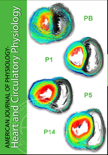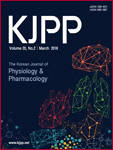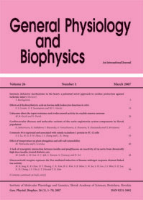
Current Research in Physiology
Scope & Guideline
Fostering Knowledge for Tomorrow's Physiological Challenges
Introduction
Aims and Scopes
- Integrative Physiology:
The journal emphasizes the integration of physiological systems, exploring how different biological mechanisms interact in health and disease contexts. - Experimental Methodologies:
Current Research in Physiology employs a variety of experimental techniques, including in vivo and in vitro studies, computational models, and advanced imaging technologies to investigate physiological phenomena. - Clinical Applications:
Research published in the journal often focuses on clinical implications, linking physiological insights to health outcomes, treatment strategies, and disease prevention. - Molecular and Cellular Mechanisms:
The journal explores the molecular underpinnings of physiological processes, including signaling pathways, gene expression, and cellular interactions that influence overall function. - Environmental and Lifestyle Factors:
It addresses how external factors, such as exercise, diet, and environmental stressors, impact physiological responses and adaptations.
Trending and Emerging
- Exercise Physiology and Performance:
Recent publications have increasingly focused on the physiological effects of various exercise modalities, including endurance and resistance training, emphasizing their impact on health and athletic performance. - Neurophysiology and Brain-Body Interaction:
There is a growing interest in understanding how neurological factors influence physiological responses, particularly in relation to stress, cognitive function, and overall health. - Metabolic Health and Disease:
Research addressing metabolic dysfunctions and their physiological implications is on the rise, reflecting a broader public health concern regarding obesity, diabetes, and related conditions. - Bioengineering and Physiological Applications:
Innovative applications of bioengineering techniques to study and manipulate physiological systems are increasingly prominent, highlighting the intersection of technology and physiology. - Microbiota and Gut-Brain Axis:
Emerging studies are focusing on the role of gut microbiota in influencing physiological processes, particularly in the context of mental health and metabolic function, signaling a shift towards integrative health approaches.
Declining or Waning
- Traditional Cardiovascular Studies:
Research focusing solely on traditional cardiovascular parameters, such as heart rate and blood pressure, has seen a decline as more integrative and holistic approaches to cardiovascular physiology gain prominence. - Animal Models in Isolation:
The use of specific animal models in isolation, without considering translational implications, appears to be waning as researchers increasingly seek to bridge findings to human health and disease. - Basic Mechanistic Studies:
While these studies were once prevalent, there is a noticeable shift towards studies that emphasize clinical relevance and practical applications, leading to a reduction in purely mechanistic investigations without broader implications.
Similar Journals

AMERICAN JOURNAL OF PHYSIOLOGY-HEART AND CIRCULATORY PHYSIOLOGY
Pioneering insights in cardiovascular science.AMERICAN JOURNAL OF PHYSIOLOGY-HEART AND CIRCULATORY PHYSIOLOGY, published by the American Physiological Society, is a premier journal dedicated to advancing the understanding of cardiovascular physiology. With an ISSN of 0363-6135 and an E-ISSN of 1522-1539, this esteemed journal has been a vital resource since its inception in 1977, and continues to publish cutting-edge research that shapes the fields of cardiology and physiology. Recognized as a Q1 journal in multiple categories, it ranks impressively within the top tier of its fields, including a notable 18th percentile rank in Physiology (medical). The journal’s impact factor and extensive reach in the academic community affirm its significance in promoting innovative studies and insights. While it does not offer open access options, the journal remains accessible through institutional subscriptions, making it an essential tool for researchers, professionals, and students alike, who are keen to stay abreast of the latest developments in heart and circulatory physiology. For further information, the journal is based in the United States at 6120 Executive Blvd, Suite 600, Rockville, MD 20852. As a cornerstone of cardiovascular research, it invites contributions that push the boundaries of knowledge and enhance clinical practice.

COMPARATIVE BIOCHEMISTRY AND PHYSIOLOGY A-MOLECULAR & INTEGRATIVE PHYSIOLOGY
Exploring Cutting-edge Research in Comparative Physiology.Comparative Biochemistry and Physiology A-Molecular & Integrative Physiology, published by Elsevier Science Inc, serves as a pivotal platform for cutting-edge research in the fields of biochemistry, physiology, and animal sciences. The journal, holding an esteemed presence with an ISSN of 1095-6433 and E-ISSN 1531-4332, spans a remarkable history of contributions since its inception in 1960, showcasing significant findings up to 2024. As a Q1 quartile journal in Animal Science and Zoology and featuring competitive rankings across various biochemistry and physiology disciplines, it stands out as a leading resource for both established researchers and emerging scholars alike. The journal is committed to publishing high-quality, peer-reviewed articles that deepen our understanding of molecular and integrative physiology, playing an essential role in advancing scientific knowledge and fostering interdisciplinary collaboration. With access options that prioritize the dissemination of impactful research, Comparative Biochemistry and Physiology continues to shape the dialogue within these dynamic fields.

JOURNAL OF PHYSIOLOGY-LONDON
Championing Excellence in Physiological ResearchJOURNAL OF PHYSIOLOGY-LONDON, published by WILEY, stands as a prestigious beacon in the fields of Physiology and Sports Science. Established in 1878, this journal has a rich history of disseminating crucial research findings and advancing scientific knowledge, continuing its impact into the present day with an anticipated convergence in 2024. Recognized for its excellence, it ranks in the Q1 category for both Physiology and Sports Science in 2023, cementing its position within the top echelons of academic publications. With a Scopus rank of #26 out of 193 in the Biochemistry, Genetics and Molecular Biology _ Physiology category, the journal boasts an impressive 86th percentile, reflecting its high-quality contributions to the scientific community. Although not open access, its extensive archive and reputation ensure that it remains a vital resource for researchers, professionals, and students eager to stay at the forefront of physiological science. For those looking to deepen their understanding of physiological mechanisms and their applications, the JOURNAL OF PHYSIOLOGY-LONDON is an indispensable resource.

PHYSIOLOGICAL RESEARCH
Empowering Researchers with Cutting-edge FindingsPHYSIOLOGICAL RESEARCH, published by the Academy of Sciences of the Czech Republic, Institute of Physiology, serves as a prominent platform for scholarly contributions in the field of physiology and related disciplines. With an impact factor that highlights its significance—ranking in the Q2 category in Medicine (miscellaneous) and the Q3 in Physiology as of 2023—this journal has established itself as a vital resource for researchers, professionals, and students. Since becoming Open Access in 1991, it has broadened its reach, ensuring that vital research is freely available to academic communities worldwide. Covering a diverse range of topics, PHYSIOLOGICAL RESEARCH attracts submissions that advance the understanding of physiological processes, making it an indispensable resource for those invested in the field. Based in Prague, Czech Republic, this journal offers an enriching medium for discourse and dissemination in physiology, contributing to the global scientific landscape.

Journal of Physiological Sciences
Advancing Insights into Human PhysiologyThe Journal of Physiological Sciences, published by BMC, stands as a prominent platform for the advancement of research in the field of physiology. Based in Japan, this open-access journal (ISSN: 1880-6546, E-ISSN: 1880-6562) is committed to disseminating high-quality scientific articles that explore various facets of physiological functions and mechanisms. With a 2023 Scopus ranking placing it within the 41st percentile in the category of Physiology, it is recognized for contributing significant insights that bridge basic and applied physiological research. The journal maintains a Q2 quartile ranking within its category, highlighting its impact within the scientific community. Researchers, professionals, and students are encouraged to engage with cutting-edge studies published from 2006 to 2024, fostering an environment of knowledge accessibility and scientific collaboration. The journal not only serves as a vital resource for those involved in physiological research but also promotes broader understanding and application of physiological principles across various health and science sectors.

KOREAN JOURNAL OF PHYSIOLOGY & PHARMACOLOGY
Connecting researchers and professionals in the heart of pharmacology.Welcome to the Korean Journal of Physiology & Pharmacology, a pivotal academic platform dedicated to advancing the disciplines of physiology and pharmacology. Published by the esteemed Korean Journal of Physiology & Pharmacology, this journal has been disseminating valuable research findings since its inception in 1997 and continues to be a critical resource for researchers, professionals, and students in South Korea and beyond. With an ISSN of 1226-4512 and E-ISSN of 2093-3827, it offers insights into various aspects of drug action and physiological mechanisms. Although this journal currently does not subscribe to Open Access, it plays a vital role in bridging the gap between experimental and clinical studies, receiving commendations for its quality. In the 2023 Scopus rankings, it is notably positioned in the Q3 quartile for Pharmacology and Q4 for Physiology, reflecting its commitment to excellence. As the journal converges towards its comprehensive coverage in 2024, it remains a cornerstone for those looking to engage deeply with critical developments in these fields.

GENERAL PHYSIOLOGY AND BIOPHYSICS
Illuminating Complex Biological InteractionsGENERAL PHYSIOLOGY AND BIOPHYSICS, published by AEPRESS SRO, is a pivotal journal in the fields of biophysics and physiology, dedicated to advancing knowledge and fostering research in these increasingly vital disciplines. Established in 1983 and set to converge in 2024, the journal provides a platform for scholarly articles that explore the intricate relationships between biological systems and physical principles. Its current category quartiles include Q3 in Biophysics and Q4 in Physiology, demonstrating a growing influence among researchers, with current Scopus ranks reflecting its commitment to quality and relevance. Despite not being an open-access publication, the journal remains a valuable resource for professionals and students aiming to stay informed on the latest discoveries and methodologies. By supporting interdisciplinary research and innovation, GENERAL PHYSIOLOGY AND BIOPHYSICS plays a crucial role in shaping the understanding of complex biological interactions and applications in medicine.

Function
Advancing the frontiers of cancer research and molecular medicine.Function is a pioneering open access academic journal published by Oxford University Press, dedicated to advancing research in the fields of Cancer Research, Cell Biology, Molecular Medicine, and Physiology. Since its inception in 2020, this journal has quickly established itself as a vital resource for researchers and professionals alike, achieving a commendable impact factor in the 2023 rankings, where it stands in the Q2 quartile across multiple categories. Located in the heart of the United Kingdom, Function aims to foster a global exchange of knowledge by providing free and unrestricted access to cutting-edge research, facilitating collaboration and innovation within the scientific community. With a robust focus on emerging discoveries and interdisciplinary approaches, this journal encourages contributions that unravel the complexities of biological functions, paving the way for transformative advancements in healthcare and related sciences. As it converges from 2020 to 2024, Function continues to be an invaluable platform for disseminating research that has the potential to shape the future of medicine and biology.

Frontiers in Physiology
Transforming understanding of physiological processes.Frontiers in Physiology, published by FRONTIERS MEDIA SA, is a leading open-access journal that has been at the forefront of physiological research since its inception in 2010. As a reputable publication based in Switzerland, it aims to foster the dissemination of groundbreaking findings across various domains of physiology, engaging a global audience of scholars and practitioners. With a commendable Q2 ranking in the fields of both general physiology and medical physiology for 2023, this journal stands out in its field, achieving a significant Scopus rank of #32/113 in medical physiology and #58/193 in biochemistry, genetics, and molecular biology. Frontiers in Physiology not only commits to maintaining high scholarly standards but also ensures that all its articles are freely accessible, thereby promoting collaborative knowledge exchange. With a clear focus on advancing our understanding of physiological processes, the journal plays a crucial role in the development of innovative approaches to health and disease, making it an essential resource for researchers, professionals, and students alike.

PFLUGERS ARCHIV-EUROPEAN JOURNAL OF PHYSIOLOGY
Elevating Research in Physiology and BeyondPflügers Archiv - European Journal of Physiology, published by Springer Heidelberg, stands at the forefront of physiological research, showcasing groundbreaking studies since its inception in the 1950s. With a distinguished ISSN of 0031-6768 and an E-ISSN of 1432-2013, this esteemed journal maintains a robust reputation, holding Q1 rankings in Clinical Biochemistry, Physiology, and Medical Physiology as of 2023. Its impressive Scopus rankings place it in the top percentile across various categories, including Biochemistry, Genetics and Molecular Biology and Medicine. Pflügers Archiv serves as a vital platform for researchers, professionals, and students, facilitating the dissemination and discussion of advanced physiological concepts and methodologies. Although it does not currently offer open access, its rigorous peer-review process ensures the highest quality publications that contribute significantly to our understanding of physiological science. Explore the depth of physiological research that shapes our academic landscape today.